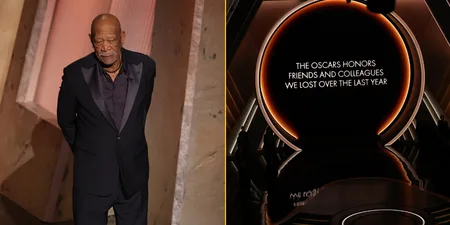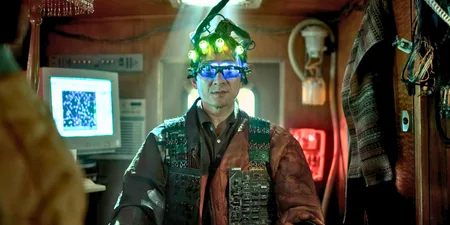What do you reckon? Has this iconic Christmas rom-com aged well?
As people are once again sitting down to roll back the years and watch classic Christmas films, many have turned to Richard Curtis’ Love Actually, arguably one of the most popular rom-coms of the 21st century.
However, especially among a younger generation who may be watching it for the first time, people are starting to realise that there may be some problematic themes in there.
I finally watched "Love Actually" and its not good! It's in fact problematic in many levels #UnpopularOpinion
— Silvia (@silviayloqueve) December 19, 2021
Of course, this debate isn’t exclusive to 2021: people have been pointing out its potential problematic tropes and attitudes for years now – last year, Insider even did a round-up of six reasons why it may not be the same festive favourite you remember.
Screen Junkies even put together one of their trademark ‘Honest Trailers’, which strips back all of the dressings up and lays out the multiple plots bare and for all to see. When you boil it down to its core characters and narrative, lots of people are pretty awful:
Love Actually is almost as problematic as the entire Harry Potter series.
Actually, I think Jack and (Just) Judy are the healthiest relationship in that trainwreck. And that's saying a lot.https://t.co/fggc6PbiI1
— 🦊:: Alli ::🦊 (@Detafo) December 14, 2021
Whether it’s the casual body-shaming of Martine McCutcheon, romanticising the act of going to a married couple’s door and essentially trying to get your foot in, or the rather blatant chauvinism and misogyny of the sexually charged Bill Nighy, Kris Marshall and arguably all of the male characters to some extent, not many come out of this film smelling like roses.
“I am Colin. God of Sex” may still be a funny line but we doubt you’d be seeing it in many scripts these days.
Perhaps one of the most problematic parts of Love Actually for many is Hugh Grant‘s character, who essentially has what many would call an inappropriate relationship with one of his employees and one negotiated from a position of power, no less.
Are parts of Love, Actually problematic? Yes. Will I still watch it at least 4x during the Christmas season? Also yes. pic.twitter.com/K1ffyKUVCy
— Sherri K (@heysherrik) December 5, 2021
While it is, of course, completely consensual, we dare say people wouldn’t be toasting the holidays with this particular romantic tale if we were talking about Boris.
Nevertheless, no character’s storyline is worse than Emma Thompson‘s, as she not only realises she is being cheated on in the most heartbreaking fashion, but she does her ‘motherly duty’ and puts on a strong face for her children, essentially letting Alan Rickman‘s character finish the film with no real consequence.
The list goes on, but although many have recognised there are shades that don’t look so flattering these days, others are still coming to its defence, reminding people that context surrounding art is important – though some would say ‘Baby, It’s Cold Outside’ is somewhat harder to defend.
My hot take list of holiday things that can be read as problematic if you’re really trying but I will insist to the death are FINE, sheesh.
Baby, It’s Cold Outside
Love Actually— Tessa the RedNosed Rein-Dare (@TessaDare) November 30, 2021
Love Actually is a mixed bag anthology of stories, and no one has to endorse every scene in it to enjoy the whole! Whether you love the movie for Bill Nighy or “just in cases” or Mr. Bean cockblocking Alan Rickman or Xmas lobster pageant, don’t let anyone tell you you can’t.
— Tessa the RedNosed Rein-Dare (@TessaDare) November 30, 2021
On the other hand, some have fallen smack bang in the middle of acceptance, denial, fence-sitting and flat out refusal to admit that one of their favourites Christmas films and rom-coms period portrays the various different ways people behave… actually.
Yes, in case you hadn’t realised, this film does exactly what it says on the tin: it presents some good people and some awful because that’s exactly what you get in real life. It shows what you people can actually be like as opposed to what you want them to be, hence why it seems to capture audiences both in Britain and abroad.
https://twitter.com/_vodkaqueen/status/1470559279283417093?s=20
The fact of the matter is, most people recognise that it’s a film of its time and although it’s really not that long ago in relative terms, there were still a lot of problematic, antiquated and fundamentally flawed attitudes back then. We still haven’t come far enough today, in case you hadn’t realised.
So, while many may want it ‘cancelled’, the majority seem happy to see it for what it is: a now-dated film that still has lots of good bits and some less so – that doesn’t mean it doesn’t capture a less glossy and very real picture of different relationships look like.
https://twitter.com/Exposing40/status/1467221665805443079?s=20
It isn’t the only Christmas staple that has come under fire recently either, as it would seem that even some people want the classic Christmas tale of Rudolph the Red-Nosed Reindeer cancelled, going so far as to label it “disturbing”.
People are always going to love Love Actually and kids are always going to sing Rudolph the Red-Nosed Reindeer, just like old movies, TV shows and music are always going age ‘badly’ as society progresses.
Related links
- Watching Christmas films is officially good for you, says expert
- The definitive list of everything The Simpsons predicted that shockingly came true
- If Die Hard is a Christmas film, then so is Lethal Weapon




































